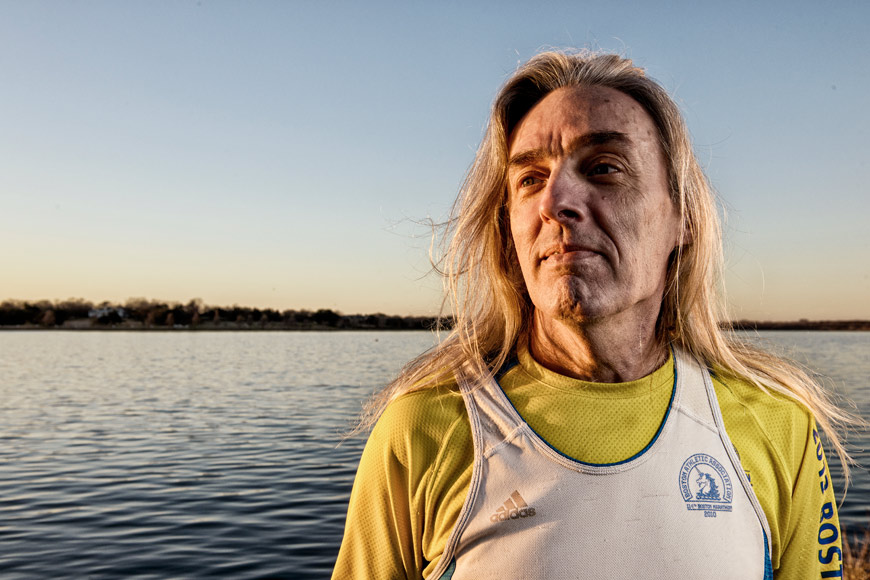Ron McCracken has run more than 6,000 consecutive days. To him, it is therapy, and also kind of an addiction.
You might’ve seen him at White Rock Lake, jogging along the trail in a once-white shirt with the words “Boston Strong” handwritten in pen on the front, holding a tattered American flag in his right hand.
People often salute the flag as he passes by, he says. His favorite encounters are when Marines give him a traditional “Ooh-Rah!”
He plans to run his 16th consecutive Boston Marathon next month, even though he still carries emotional scars from the 2013 bombing.
McCracken became enamored with running when he was almost 10 in the summer of 1972. He watched American distance runner Frank Shorter take the gold medal in the Olympics.
“I was just riveted,” McCracken says. “I still remember when he entered the stadium just thinking, ‘This is the coolest thing ever.’ He inspired a lot of people.”
The next day McCracken asked his mom to measure a mile around the neighborhood, and he started running. A year later his mom bought him a stopwatch, and he pushed himself to run faster.
He dreamed of becoming a world-class miler, but he soon realized he’d never run a 4-minute mile.
“No matter how bad I wanted to, my body wasn’t designed that way,” he explains. “I realized early on that the longer I ran, the better it was for me.”
As a teen, McCracken struggled with depression, which he still battles today.
“I’ve always been a very emotional person. Every single day I was angry as hell,” he says, “but running kept me out of trouble. If I didn’t have running, I would either be dead or in jail — probably both.”
Luckily, his coaches recognized his need for an outlet. Even though he wasn’t always the easiest student to coach, they stuck by him, he says.
Injuries kept him from taking it past college. In 1992 he tried his first marathon, and it hurt so bad he didn’t run another until 1998.
[quote align=”right” color=”#38b6d5″]“If I didn’t have running, I would either be dead or in jail — probably both.”[/quote]
In 2000 he ran the Boston Marathon and has done so every year since, but it has been bittersweet — in 2005, his best friend died the day after the race.
“The first call I got when I got back was that one. It was very sudden and unexpected. He was 40.”
Then in 2009, McCracken’s mother passed away, also unexpectedly, while he was in the air on the flight home.
“I called her from the running store before I left for the airport,” he says. “She was at work and I asked her how she was doing — had a little conversation. So you can imagine, at 7 a.m. I get a phone call that mom’s dead. That can’t be right. I just talked to her.”
The experiences gave him “a borderline phobia” about the Boston Marathon, he says.
But he kept running it anyway, partly for himself and partly for his mom, who was his biggest fan and supporter and who adored the event, he explains. McCracken remembers vividly the day in 2013 that the race ended abruptly when two brothers set off a homemade bomb at the finish line, killing three people and injuring 264 others — how hundreds of emergency vehicles packed the street for miles and the National Guard wouldn’t answer his questions. He remembers reaching out and touching an ambulance as it drove by.
“In the hours after it, even though I didn’t understand the full gravity of it, I remember wandering around Boston and I just thought, ‘This can’t be good for us. This can’t be good for our souls.’ ”
A couple of days later, while running near White Rock Lake, an ambulance passed. When the siren clicked on, McCracken was propelled into the throes of a panic attack, a classic sign of Post Traumatic Stress Disorder.
That’s when he started running with the American flag.
“I knew I needed something,” he explains. “When I’d run by veterans they’d salute the flag, and that really touched me. I left it at home one day and a couple different people I don’t even know asked me, ‘Where’s your flag at? We love seeing you run with the flag.’ I love that people get it. It’s a symbol of defiance that ‘You won’t stop us.’ ”
Like thousands of others, he went back to Boston the next year to reclaim the finish line.
“Leading up to it, people would always ask me, ‘Are you scared about going back?’ and I would say, ‘It doesn’t matter. We have to.’ ”
“I left it at home one day and a couple different people I don’t even know asked me, ‘Where’s your flag at? We love seeing you run with the flag.’ I love that people get it. It’s a symbol of defiance that ‘You won’t stop us.’ ”






